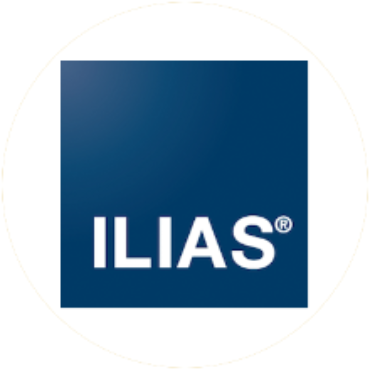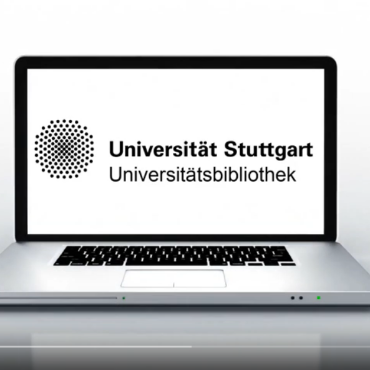- Improve your own visibility and scientific identity on the internet
- Maintain author profiles in literature databases
- Learn the basics of bibliometrics
- Determine bibliometric indicators, e.g. Journal Impact Factor, CiteScore, h-Index
- Understand responsible metrics
Course Offer and Information Competence
The University Library’s guided tours and courses are offered regularly at both City Center and Vaihingen location, especially at the beginning of the semester, however. The number of participants per course is restricted for lack of space, so please register in time via the online registration.
If required, further events and dates can be offered – for groups, seminars, tutorials, or new employees, for example.
If you are interested, please contact: Hannah Kempe or Ute Dittmar (Vaihingen).
Courses of the University Library
Orientation
Are you new to the University of Stuttgart - as a student or employee - and would like to use the University Library? Would you like to use the University Library as an external user, secondary school student, employee of a company, or out of personal interest?
Then you may have the following questions: How do I use the catalog of the University of Stuttgart library system? Where are the books and journals I need located? How do I borrow books? How do I use the services of the University Library on the Internet? You will find answers to these and many more questions at this event.
Duration approx. 60 minutes.
This course is offered as a web seminar.
You will receive an invitation to the online course a few days before the event date.
If you are beginning with Master's studies at University of Stuttgart and you want to use library resources, this tour is for you. On our library tour we will familiarize you with the University of Stuttgart Library's layout and resources. You will find out about opening hours, borrowing rights, loan periods, finding books and journals, requesting items, placing holds and checking your library account. You will learn how to use our online catalog and other internet-based library services. You will learn how to access electronic journals, databases and other licensed electronic resources.
The focus will be on subjects for international Master's programs of science or engineering. Other international students, scientists or employees are also welcome.
Duration: 60 minutes
Reference Management
This event is aimed at everyone interested who has no previous knowledge of Zotero.
In this course, you will learn about the most important features of the reference management system Zotero: You will learn how to collect and organize references and easily incorporate them into your text.
The free open-source tool can be used on Windows, macOS or Linux.
Course content:
- System structure and features
- Collecting references and PDFs, creating notes
- Organizing knowledge with collections and tags
- Adding citations (footnotes or in-text citations) to word processing documents
- Creating a bibliography
Duration: approx. 90 minutes.
Please install Zotero in advance: https://www.zotero.org/download/
You will be needing Zotero, a browser connector, and the Word/LibreOffice plugin.
The course is offered as a web seminar.
You will receive the invitation to the online course a few days before the event date.
This online seminar is part of a virtual event series of the TU9 Libraries.
Research Data Management
Whether it's well-curated workflows, well-crafted software or well-organized research data – these winning ways of working are not just worthwhile, but vital for ensuring your research is traceable, trustworthy and truly reproducible.
Content:
Various services and facilities at the University of Stuttgart support the secure storage, traceable documentation and findable and reusable publication of data and software.
After a short general introduction to research data management and a presentation of the services at the University of Stuttgart, we will create data sets in the DaRUS data repository in a hands-on session and lay the foundations for our own data management plan.
Please bring your own laptop.
Provider: Competence Center for Research Data (FoKUS)
Speaker: Dr. Dorothea Iglezakis
Target group: PostDocs / Doctoral Candidates…
Date / Seminar times /Venue:
- Online
- December 17th, 2025; 4:00 p.m. – 5:00 p.m.
- webex
Contact: Dr. Dorothea Iglezakis
All further courses will be held in German only.
Courses of the TU9 Libraries
Research Data Management
Data is an essential component of research and therefore invaluable for researchers. Systematic research data management provides support for daily research activities in fulfilling good scientific practice (GSP) and thus enables the traceability, reproducibility, and reusability of scientific research. An effective approach to systematically organize the handling of your research data is the creation of a data management plan (DMP).
This presentation will provide you with the knowledge and tools you need to create a comprehensive and effective data management plan in line with Horizon Europe requirements for a DMP deliverable. This event is ideal for researchers and project managers with recently funded Horizon Europe projects.
Horizon Europe emphasizes Open Science and makes research data management (RDM) and data management planning (DMP) important components of research projects. This is reflected in the requirement to submit a DMP deliverable 6 months after the beginning of the funded project.
The presentation will take you step-by-step through the process of creating a DMP using the FAIR principles - Findable, Accessible, Interoperable, Reusable. You will explore what a DMP includes, from summarizing data to making it FAIR, both for your project collaborators and the broader scientific community. The presentation will cover secure data storage and access management, metadata and documentation, handling sensitive data, choosing repositories for publication, and defining roles and resources for effective data management.
Target audience: Researchers
Lecturer: Service Center Research Data, SLUB Dresden
Date: 28.01.2026 2 p.m. - 4 p.m.
Previous Knowledge: none required
Tool: Zoom
At the heart of good management is a plan. Just as research proposals outline the scope and goals of research projects, data management plans (DMP) specify the handling of research data during and after a research project.
In a DMP, researchers document how data is collected, managed, stored, retained and published throughout the lifecycle of a given research project.
Creating DMPs (according to the specifications of funders) at the beginning of the project helps to prepare for the technical requirements during the active research phase and to determine the necessary resources (budget) for the upcoming data challenges.
During this training session, interactive examples and DMP tools demonstrate how a DMP can present an anchor for you research data management.
Lecturer: Dr. Kerstin Wedlich-Zachodin (KIT-Bibliothek)
Target audience: Scientific staff, Researchers
Date: 11.02.2026 2 p.m. - 3 p.m.
Registration: Please register here.
Tool used: Zoom
This course will present the basics of research data management (RDM). You will learn the most important aspects of RDM and we will explain requirements by third-party funders and how you can best fulfill those requirements.
Data is an essential component of research and therefore invaluable for researchers. Whether small samples or "Big Data" - the systematic and transparent handling of research data is a central element of good scientific practice. Systematic research data management provides support for daily research activities in fulfilling good scientific practice (GSP) and thus enables the traceability, reproducibility, and reusability of scientific research. It can also facilitate collaboration within groups.
The presentation is aimed at those responsible for RDM as well as research group leaders.
This presentation offers solutions to the following questions about RDM:
- How do you create a joint research data management system in a working group or professorship?
- How can shared data, documents, metadata and documentation be stored, structured and organized securely and comprehensibly?
- How do you maintain motivation in the working group to adhere to agreed RDM processes?
Target audience: Researchers
Lecturer: Service Center Research Data, SLUB Dresden
Date: 14.01.2026 3 p.m.- 4:30 p.m.
Previous Knowledge: none required
Tool: Zoom
Bibliometrics
Target audience: Researchers
Lecturers: Mamta Dwivedi (KIT-Bibliothek)
Date: 22.01.2026 10 a.m. - 11:00 p.m.
Tool used: Zoom
Registration here.
Ask a Librarian
- Further information
- Write an email to the University Library






